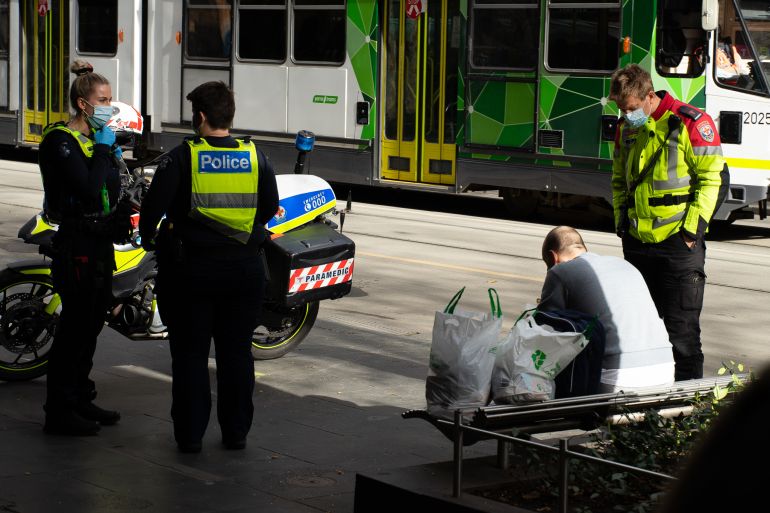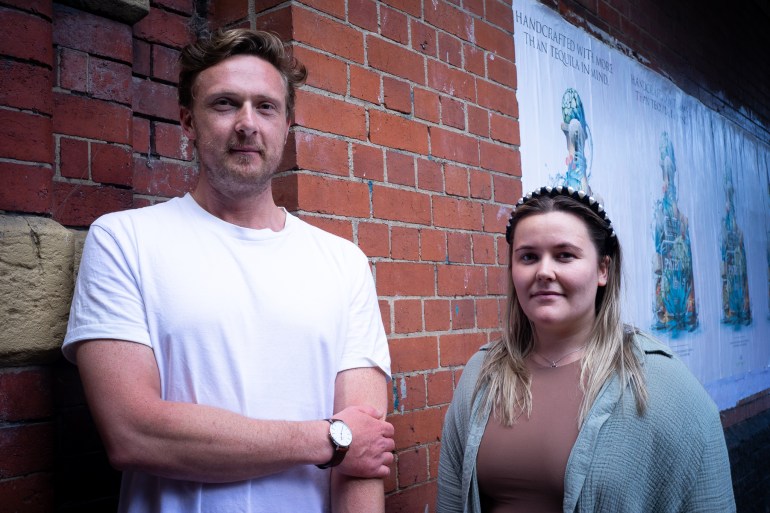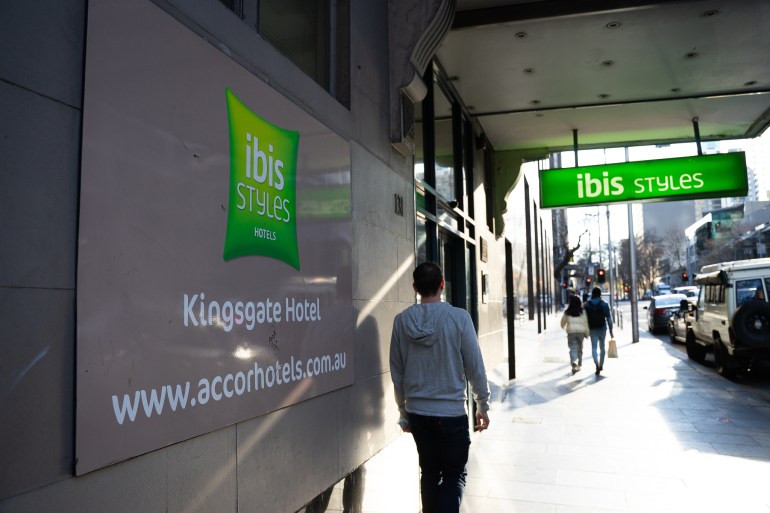How has COVID-19 affected Australia’s homeless?
During lockdown, hundreds of homeless people in Melbourne were moved into hotels. But what will happen to them now?

Melbourne, Australia – When Melbourne went into lockdown between March and October last year, the city’s rough sleepers were considered to be at high risk.
Without a secure and isolated place in which to lock down, the concern was that they could easily catch and transmit COVID-19.
Keep reading
list of 4 itemsHow Australia’s ‘Stolen Generations’ were left homeless
Australia’s ‘invisible’ homeless women
New Zealand: The struggle to find a ‘decent home’
The Victorian government responded by providing funding for people experiencing homelessness to access hotel rooms across the city, which were empty due to the lack of tourists.
Dave Lovelock is an outreach worker at Launch Housing, a not-for-profit organisation that assists people experiencing homelessness.
Launch Housing are one of a number of similar organisations who were involved with the government hotel programme due to their close connections with rough sleepers.
Dave Lovelock’s job was to scour the streets to find people who were at risk of rough sleeping during the pandemic and offer them a place to stay at one of the designated hotels.
“The response to rough sleeping during the COVID lockdown in Victoria was that everybody who had nowhere to shelter was eligible for accommodation,” he explains.
Dave says that while it is not uncommon for organisations such as Launch Housing to assist rough sleepers with a short stay in a hotel room, they had never done so on this scale before.
“Agencies accessed [the hotels] as they always have done,” he says. “But more en masse to put people who had otherwise been sleeping in the streets or in their cars or in overcrowded dwellings.”

Hundreds of people took up the offer to transfer to a hotel.
Dave says those people often experienced “overwhelming benefits to their structure and stability in their lives, somewhere to feel safe and secure. And their mental health improved significantly as to being on the streets.”
Conversely, however, some people – women, in particular – felt unsafe in the overcrowded hotels, he explains. Other rough sleepers simply did not want to go into a hotel at all, preferring the routine and familiarity of secluded places on the streets they were used to sleeping on.
While the decision to fund hotel rooms for rough sleepers was an apt and prompt response to the pandemic, Dave acknowledges that now restrictions are easing, the Victorian government is faced with another dilemma – what to do with people from the homeless community who have now been housed for many months.
The Big Housing Build
The Victorian government recently announced a $5.3bn investment to build social housing.
More than 12,000 homes will be built in what is being called the “Big Housing Build” with priority housing set aside for women and children experiencing domestic violence, Indigenous people and people suffering mental illness.
Richard Wynne, Victoria’s minister for housing, told Al Jazeera in a statement that “the impacts of the pandemic made a major investment in housing vital – not only to supporting those struggling with secure housing, but to reviving our economy.”
The majority of these homes are to be built within the next four years in what the minister describes as “the largest single investment in social and affordable housing of any government in Australia, ever.”

The announcement preceded the release of the Victorian government inquiry’s final report into homelessness, chaired by Senator Fiona Patten.
She says that the release of the report “has come at a very opportune moment” and that she is waiting to see whether the government accepts the inquiry’s 51 recommendations.
“To keep homelessness a priority is something I see as my task as the person who chaired this report,” she says. “I take it personally to see these recommendations be implemented.”
The impact of COVID-19
While the news of the Big Housing Build has been well received by those in the homelessness sector, some say the investment is years too late and query why it took a pandemic to force the government’s hand.
Bevan Warner, CEO of Launch Housing, says that the recent announcement of funding by the state government “is really good, really principled, but it’s making up for a lot of lost time – I think the government has acknowledged that.”
“But if COVID hadn’t come along I wonder where we’d be,” he adds.
Victoria has had the lowest investment into social housing of all Australia’s states and territories, and also has the lowest rate of available social housing per person.
This historical lack of investment means that, despite the Big Build, Victoria will remain critically short of available housing, with estimates suggesting that an additional 166,000 homes will be required by 2036.
“They are sort of fixing it up now, but they are fixing it up because of this confluence of events,” says Bevan. “The public health imperative suddenly met the embarrassment of the underinvestment which met the opportunity for [economic] stimulus.”
Bevan believes that while homelessness support has admittedly gotten better in the last decade, if there are no homes for people to be directed to, such service responses remain limited.
“It’s like doctors not being able to operate or provide medicine – just come to the hospital, check in, we’ll talk to you a little bit and see you next time.”
Melbourne Zero
Bevan Warner suggests that governments in Australia do not take the issue of homelessness seriously enough.
He says that while education and health are viewed as fundamental to society – as evidenced by free, government-supported access to both schools and medical assistance – access to housing is not supported in the same way.
“We don’t have a housing policy or a housing framework that says the first-order priority of government is that everyone should have a home,” Bevan explains.

He also points out the hypocrisy of spending billions on the military’s defence budget – more than 44 billion Australian dollars (US$32bn) in 2020 – while spending so little on housing.
He contends that if the defence budget is ostensibly to keep people safe, then housing should be considered in the same manner.
“Because there can be no safety without a home,” he says.
Bevan’s vision is that Melbourne will progress towards what he calls “Melbourne Zero” – a city in which there is zero homelessness.
“Why can’t we get to zero rough sleeping because we fix it as soon as it appears,” he asks.
He says while Melbourne is known globally for international sports and high quality restaurants, his vision is for the city to be known for having no homelessness.
“Why can’t Melbourne be a world-leading city in ending homelessness?”
This series was supported by the City of Yarra.